In this blog article you’ll find out about how much a roll forming machine cost, which makes for the best one for you and what to consider before purchasing. Make sure to check out this blog as you’re looking for information on how to purchase the best roll forming machine!
What is a Roll Forming Machine?
A roll forming machine is a type of industrial robot that is used in the manufacturing of various types of plastic and metal products. Roll forming machines are similar to stamping machines in that they use pressure to deform a sheet of material. However, roll forming machines are much more versatile because they can create a variety of shapes, including tubes, bars, and sheets. The primary advantage of using a roll forming machine over other methods is that it allows for more precise and accurate product fabrication. Additionally, roll forming machines are often faster and more efficient than other types of industrial robots.
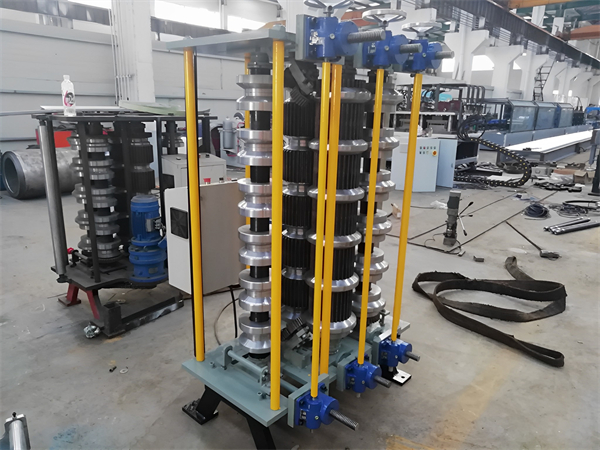

What are the Different Types of Roll Forming Machines?
There are different types of roll forming machines, each with its own set of benefits and drawbacks. Here’s a look at the three main types:
- Sheet Metal Forming Machines: These machines use a sheet metal die to create shapes out of metal sheets. They’re best for simple forms like tubes or round objects, as they can’t handle complex contours or curves.
- Coil Formation Machines: These machines use a coil formation mechanism to form coils or ropes out of metal sheets. They’re best for intricate designs that need lots of flexibility, like automobile parts or medical devices.
- Die Cast Forming Machines: Die cast machines use a die to create finished products from metal sheets. They’re good for more complex shapes than either sheet metal forming or coil formation machines, but they can be more expensive and difficult to operate.
-
 Weld pipe roll forming machine
Weld pipe roll forming machine -
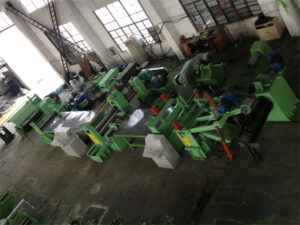 Cut To Length Line
Cut To Length Line -
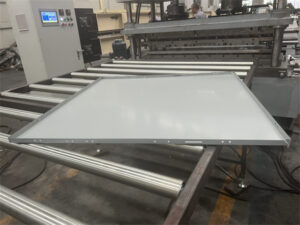 Rockwool Sandwich Panel Line
Rockwool Sandwich Panel Line -
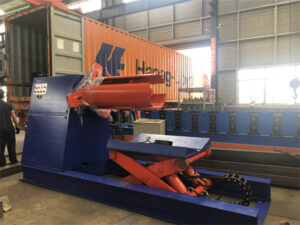 Automatic GI PPGI 5T 10T 20T Hydraulic Decoiler Machine
Automatic GI PPGI 5T 10T 20T Hydraulic Decoiler Machine -
 Automatic Galvanized Steel Stainless Steel Coil Embossing Machine
Automatic Galvanized Steel Stainless Steel Coil Embossing Machine -
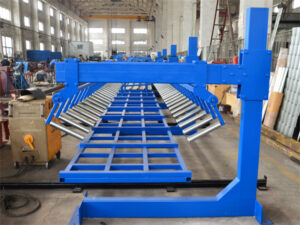 Automatic 12 meters auto stacker for sheet
Automatic 12 meters auto stacker for sheet -
 Automatic Metal steel sheet coil slitting machine production line
Automatic Metal steel sheet coil slitting machine production line -
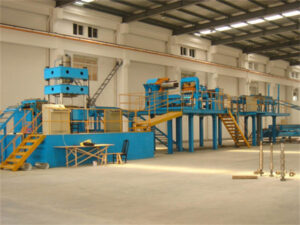 Polyurethane Foam PU Roof and Wall Sandwich Panel Production Line
Polyurethane Foam PU Roof and Wall Sandwich Panel Production Line -
 High speed Guard Railway Crash barrier roll forming machine
High speed Guard Railway Crash barrier roll forming machine
Things to Consider when Buying a Roll Forming Machine
When you’re looking to buy a roll forming machine, there are several things you’ll want to consider. First, the type of material you’ll be forming. Second, the specific features of the machine you’re looking for. Third, how much it will cost. And finally, which brand is best for your needs?
When it comes to material types, you’ll want to think about what kind of product you’ll be making. If it’s a simple plastic or rubber sheet that needs to be cut into small pieces, a manual press will do the job just fine. But if you’re working with heavier materials that require more precision or a complex shape, a roll forming machine will give you the best results.
Another consideration when buying a roll forming machine is what features are important to you. Some machines come with automatic feeding systems that help reduce human error while forming products. Others have long life spans and high output rates so that you can produce lots of products in record time. And lastly, some machines come with built-in safety mechanisms that help keep everyone safe while working on them.
Finally, it’s important to consider which brand of machine is best for your needs. There are plenty of great machines out there from different brands, so it’s important to do your research and find the one that meets your specific needs. Some of the most popular brands include Viking Manufacturing, Formlabs, and CNCZone.
How Much Does A Roll Forming Machine Cost?
Roll forming machines are expensive, but they can produce high-quality parts quickly and efficiently. The cost of a roll forming machine depends on the features and specifications that you need. However, most roll forming machine cost between $10,000 and $100,000.
The main roll forming machine cost of a roll forming machine include the machine itself, the materials needed to operate it, and the labor required to set it up and use it. Most roll forming machines require either a CNC or manual operation. CNC machines are more expensive but allow for more precise output. Manual machines are cheaper but may require more skill and experience to operate.
Another cost associated with roll forming is tooling. Rollforming machines typically require specialized tools to produce accurate parts. These tools can be expensive to purchase and maintain, so you should factor this cost into your budget when purchasing a machine.


Conclusion
Depending on the type of machine you need and your specific needs, finding the right roll forming machine can be challenging. To make things easier for you, we’ve put together this guide with information on what to look for in a roll forming machine as well as some of the best machines on the market. So whether you’re starting from scratch or just looking to update your current equipment, read on to learn more about how much the roll forming machine cost and which one is best for you!
FAQ
What industries use roll forming?
Many industries use roll formed parts such as the automobile industry, tools, and dyes industry, metal furniture industry, construction, railways and others. There are also several types of roll forming processes such as roll bending, flat rolling, foil rolling, ring rolling and controlled rolling.
